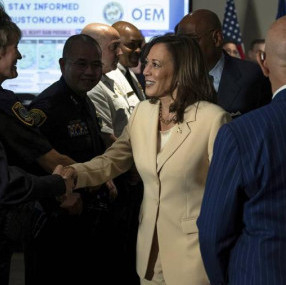
© TASS
Last weekend Copenhagen hosted a meeting of aides and national security advisers from both the West and the so-called Global South. The latter are those refusing to condemn Russia’s special military operation in Ukraine or support the Western sanctions regime against Moscow. There is only limited information about the meeting, but its participants are known to have discussed cooperation to support Ukraine in its armed confrontation with Russia. Part of participants were persuaded into joining the anti-Russian coalition, while others were offered to get more actively involved.
In Ukraine itself, the Copenhagen session was regarded as a triumph of President Vladimir Zelensky’s message voiced on May 22 at the G7 summit in Osaka, Japan, when he proposed to actually hold a conference involving as many countries as possible to condemn Russia's "aggression". The idea was understandably endorsed by the United States and NATO, with Washington having virtually arranged the meeting in the Danish capital.
Moreover, a relevant agreement was reached during Washington-hosted negotiations between American President Joe Biden and Danish Prime Minister Mette Frederiksen, The Financial Times (FT) writes. In Copenhagen, the key US speakers were National Security Adviser Jake Sullivan and Under Secretary for Political Affairs Victoria Nuland — people in charge of American policy’s Ukraine track known for their anti-Russian views.
The Copenhagen event was undoubtedly part of the Western campaign to reign over the hearts and minds of the Global South. "With the war expected to rage into next year, western officials worry about preaching the virtues of Ukraine’s resistance to the converted without making sure their arguments have wider appeal, and expand the pro-Ukrainian coalition," the same FT reported just ahead of the meeting. In particular, an unnamed European official said that "only little do we realize how much the rest of the world is not convinced" of the need to support Ukraine. "They are not convinced. It’s a terrible thing to acknowledge," the official said.
Notably, the meeting featured no official agreements, which is hardly surprising because of its informal closed-door nature. Perhaps for this reason, the list of participants has been of greater interest, although kept secret, too. And yet, apart from the host and Ukraine as the guest of honor, there were representatives of the United States, Great Britain, EU, Canada, Turkey, Saudi Arabia and Japan, as well as Brazil, India and South Africa, who are BRICS members along with Russia and China.
Russia was naturally not invited, but China was. Still, Beijing abstained from sending its national security representative to the Danish capital, at least officially. Otherwise, it would have been possible to talk about a meeting of two international clubs: G7 comprising the United States, Great Britain, Italy, Germany, Canada, France and Japan (summits often engage EU leaders as well), and BRICS except for Russia.
Of course, following US Secretary of State Anthony Blinken’s visit to Beijing, Washington hoped that US-Chinese relations would get unfrozen, with China’s participation in the Copenhagen meeting to become the first move along this path. But “sleepy Joe” ruined everything by calling Chinese President Xi Jinping a "dictator", and thus making Beijing beg off attending the venue. However, a Chinese representative is reported to have visited the Danish capital, the German ARD channel claims with no official confirmation, though. Anyway, China will unlikely mend is relationship with Washington in the foreseeable future, as the East never forgives insults of the kind against national leaders.
As for confrontation between the G7 (for which read the West) and BRICS, the United States was seriously concerned about the organization’s growing influence, seeing it a real threat to its global hegemony — and quite reasonably, with this whole line of those willing to join BRICS. These are: Turkey and Saudi Arabia (both present in Copenhagen), Algeria, Argentina, Afghanistan, Bangladesh, Bahrain, Belarus, Venezuela, Egypt, Zimbabwe, Indonesia, Iran, Kazakhstan, Mexico, Nigeria, Nicaragua, UAE, Pakistan, Senegal, Syria, Sudan, Thailand, Tunisia, and Uruguay.
Their aspiration can only point to the fact that a multipolar world will be built around this club, not the US-led G7 striving to maintain and protect its international dominance and hegemony. However, the West does manage to resist so far, though literally catching at a straw as represented by the Copenhagen meeting where the United States and its allies sought to buy the Global South over to their side and make it support Ukraine.
Still, they did not apparently succeed, because they do not know how: with the "stick" method no longer functional, the West cannot find the proper "carrot" so far. Which is, by the way, recognized by some Western outlets that reveal America’s frustration about whether to try and outmuscle the Global South with economic power or make concessions, up to reforming the UN. This, we emphasize, is what India has especially insisted upon amid Washington’s blandishment to get its hands on New Delhi as a major Asian counterweight to China. This has been confirmed by Indian Prime Minister Narendra Modi’s recent visit to the United States, where he was given a red-carpet treatment.
Moscow is believed to have been most likely aware of BRICS’ engagement in the Copenhagen meeting on Ukraine, but has come up with no official response. Domestic experts think Russia only needs to keep actively developing foreign policy and trade relations with the Global South, while treating Washington's initiatives, like the Copenhagen one in a most restrained manner. After all, the fate of Ukraine is not being determined in the Danish capital, but by the military operation Russia deems bound to be successful.









